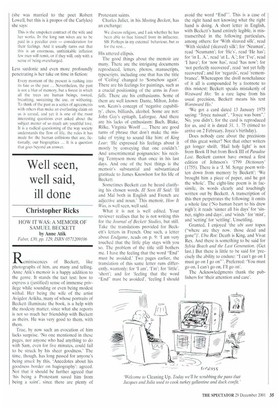Well seen, well said,
ill done
Christopher Ricks
HOW IT WAS: A MEMOIR OF SAMUEL BECKETT by Anne Atik Faber, 130, pp. 129, ISBN 0571209106 Reminiscences of Beckett, like photographs of him, are many and telling, Anne Atik's memoir is a happy addition to the genre. It stands the tact test: how to express a (justified) sense of immense privilege while sounding or even being modest withal. Her being the wife of the artist Avigdor Arikha, many of whose portraits of Beckett illuminate the book, is a help with the modesty matter, since what she reports is not so much her friendship with Beckett as theirs, He was very good to them, with them.
True, by now such an evocation of him lacks surprise. 'No one mentioned in these pages, nor anyone who had anything to do with Sam, even for five minutes, could fail to be struck by his sheer goodness.' The time, though, has long passed for anyone's being struck by this. 'Anecdotes about his goodness border on hagiography': agreed. Not that it should be further agreed that 'his being a Protestant saved him from being a saint', since there are plenty of Protestant saints.
Charles Juliet, in his Meeting Beckett, has an exchange;
We discuss religion, and I ask whether he has been able to free himself from its influence. S13: Perhaps in my external behaviour, but as for the rest...
His uttered ellipsis.
The good things about the memoir are many. There are the intriguing documents reproduced, letters, photos, manuscripts, typescripts, including one that has the title of 'Ceiling' changed to 'Somehow again'. There are his feelings for paintings, such as a crucial positioning of the arms in Footfalls. There are his enthusiasms. Some of them are well known: Dante, Milton, Johnson, Keats's concept of 'negative capability', chess, billiards, alcohol. Some are not: John Gay's epitaph, Laforgue. And there are his lacks of enthusiasm: Bach, Blake, Rilke, Virginia Woolf .... There are good turns of phrase that don't make the mistake of trying to sound like him: of King Lear: 'He expressed his feelings about it mostly by conveying that one couldn't.' And unsentimental poignancies: his reciting Tennyson more than once in his last days. And one of the best things is the memoir's substantial and substantiated gratitude to James Knovvlson for his life of Beckett.
Sometimes Beckett can be heard clarifying his chosen words. Ill Seen Ill Said: 'Ill and Mal both in English and French are adjective and noun.' This memoir, How It Was, is well seen, well said.
What it is not is well edited. Your reviewer realises that he is not writing this for the Journal of Beckett Studies, but still, Take the translations provided for Beckett's letters in French. One such, a letter about Endgame, reads on p. 9: 'I am very touched that the little play stays with you so. The problem of the title still bothers me. I have the feeling that the word "End" must he avoided.' Two pages earlier, the translation of this same letter runs differently, wantonly: for 'I am', 'I'm': for little', `short'; and for 'feeling that the word "End" must be avoided', 'feeling I should avoid the word "End" '. This is a case of the right hand not knowing what the right hand is doing. A short letter in English, with Beckett's hand entirely legible, is mistranscribed in the following particulars, among others: for 'With sleaved silk', read 'With sleided (sleaved) silk'; for 'Neuman', read 'Neumann'; for 'He's', read 'He has'; for 'in L. A.', read 'at L. A.'; for 'I've'. read 'I have.; for 'now has', read 'has now'; for 'not perfectly recovered', read 'not yet fully recovered'; and for 'regards', read 'remembrance'. Whereupon the droll nonchalance of it all is compounded by a footnote to this mistext: Beckett speaks mistakenly of Westward Ho: 'In a rare lapse from his usual precision, Beckett means his text Worstward Ho.'
'We got a card dated 13 January 1975 saying: -Joyce naissait", "Joyce was born".' No, you didn't, for the card is reproduced for us, and it is dated 31. 1. 75 (timed to arrive on 2 February, Joyce's birthday).
Does nobody care about the precisions of this great writer? Not that other writers get longer shrift. 'Hail holy light' is not from Book II but from Book III of Paradise Lost. Beckett cannot have owned a first edition of Johnson's '1799 Dictionary' (1755). There is a 'J. M. Synge poem written down from memory by Beckett': 'We brought him a piece of paper, and he got the whole'. The eight-line poem is in facsimile, its words clearly and touchingly written out by Beckett. A transcription of this then perpetrates the following: it omits a whole line (No human heart to his drew nigh): it reads 'sinner all his days' for 'sinner, nights and days', and 'winds' for 'mist'. and 'setting' for 'settling'. Unsettling.
Granted, I enjoyed 'the ubi sunt topos ("where are they now, those dead and gone")'. Libu Roi: Death is King, and Vivat Rex. And there is something to be said for Sylvia Beach and the Last Generation. (Get last.) But there is little to be said for 'pre cisely the ability to endure: can't go on I must go on I go on" '. Preferred: 'You must go on, I can't go on, go on'.
The Acknowledgments thank the publishers for 'their attention and care..


























































 Previous page
Previous page